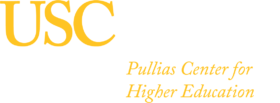The USC Pullias Center for Higher Education’s partnership with Get Schooled studied digital strategies for improving college access and success among senior-year high school and first year college students from minoritized backgrounds. Findings, insights, and recommendations from two multi-year studies are now available across a newly-released research report and pair of research briefs.
Within the last decade, the college access and success fields have been inundated with approaches that rely on technology to relay information and provide support to prospective college students from minoritized backgrounds. Now with K-16 institutions responding to the likelihood of remote learning in the fall, digital tools have gained increased value. Since 2014, the Pullias Center for Higher Education has worked in partnership with Get Schooled, a national non-profit organization dedicated to helping young people get to college, find first jobs, and succeed in both. Together they have studied and piloted digital college access and success approaches, supported by generous contributions from the US Department of Education [#P116F140097], ECMC Foundation and the James Irvine Foundation. The research spanned high schools across California as well as California State University Dominguez Hills (CSUDH).
The Bolstering First-Year Success through Digital Tools report delves into research conducted at California State University, Dominguez Hills to address the challenges of fostering a sense of belonging and ultimately improving academic success among first year college students. For this study, the Toros Charge On! program was developed to educate students about campus resources and skills conducive to college persistence and success through an online platform, a personalized textline, and a gamified structure. The project was designed to amplify services already implemented by on-the-ground practitioners and to increase first-year persistence through an engaging, scalable, and cost-effective digital ecosystem. Specific objectives of the digital approach include bolstering a sense of belonging on campus, building financial literacy, promoting self-care, cultivating study skills, and fostering meaningful use of summer break.
The results of the study, shared in the report, revealed that students in the Toros Charge On! program completed more average units in their first year, held a higher average GPA, and had a higher enrollment rate for their next consecutive year.
“These findings are important because they demonstrate that investments in digital strategies and supports can have a meaningful impact on college success,” notes the Pullias Center’s Dr. Zoë Corwin, the principal investigator for these studies. “The digital nature of these programs means they can be scaled, making these findings relevant to campuses of all sizes.”
The researchers found strong campus support of the Toros Charge On! program was key for its success, as was the onboarding process for the program. Integrating meaningful incentives for student participation, as well as mitigating digital overload, also ranked as important.
The Texting to Increase College Access and Success: Lessons from the Field research brief breaks out the findings and recommendations from the texting component of the Toros Charge On! Program. “This study afforded us the opportunity to take a close look at specific ways students react to and interact with important school reminders and other information communicated through texting,” shares Corwin. “From there we were able to develop guidelines to help practitioners keep students engaged and informed through texts.” Those guidelines, found in the brief, include addressing relatability, building trust, capitalizing on milestones, strategically timing broadcasts, and geo-personalizing.
“Generation Z is in many ways creating the blueprint for all future, digitally-instinctive generations,” shares John Branam, Executive Director of Get Schooled, reflecting on the multi-year, multi-study partnership with the Pullias Center for Higher Education. “Gaining an understanding of how to unlock their potential through higher education is of great value to society.”
The researchers also recognize challenges that should be considered and addressed. “Implementing digital tools to serve large numbers of students has the potential to amplify work being done by practitioners, yet digital approaches that seek to scale up effective practices run this risk of overlooking nuances in service provision and can lead to failure,” cautions Corwin. There are also important digital equity issues to be considered. “Beyond unequal access to digital platforms and technology across populations, online resources have the potential to exacerbate inequities. Be diligent about vetting digital access issues and accommodate accordingly,” she advises.
An earlier study conducted by the Pullias Center in partnership with Get Schooled, outlined in the new Integrating Digital Tools into Financial Aid Outreach and Support research brief, explored innovative ways to increase college-going for historically minortized high school students. The goal was to use games, online content, social media and gamification to generate “buzz” around applying to college and for financial aid – and ultimately, to increase Free Application for Federal Student Aid (FAFSA), Dream Act, and college application completion rates.
“This study used a research-practice approach to bolster the college-going cultures of participating high schools through a variety of digital tools.” states Corwin. Findings from the randomized control trial illustrated a positive impact on FAFSA completion at schools who made use of the tools. The brief uses these findings to outline approaches for incorporating digital tools into practice through six recommendations to bolster financial aid outreach and service provision.
“At a time when remote learning is more prevalent than ever, we hope that the research will stimulate discussion about how to better serve at-promise students in securing financial aid for postsecondary education through the use of technology,” shares Corwin. Recommendations include coordinating information across multiple channels, integrating feedback, and leveraging gamification.
Visit the Pullias Center’s Digital Equity in Education page to learn more about this and related research or sign up for the Pullias Center’s newsletter.







